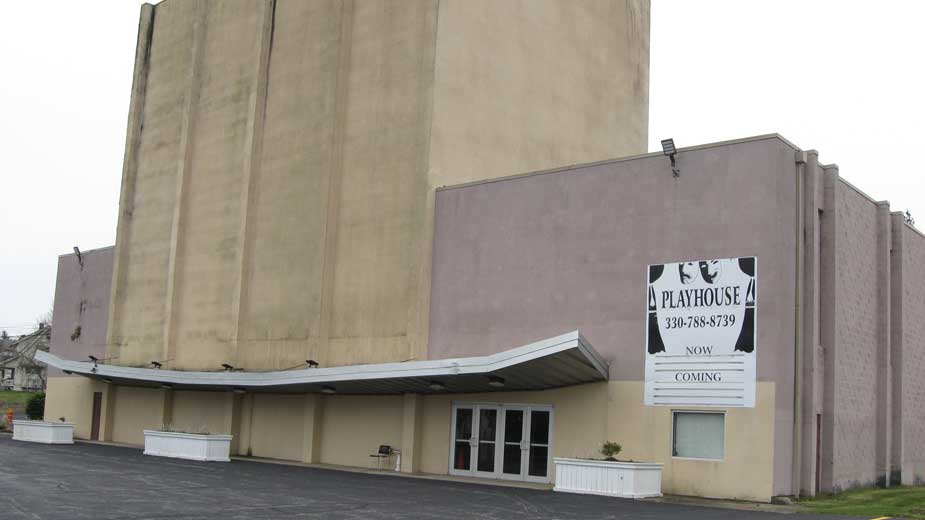YOUNGSTOWN, Ohio — “It’s the new normal” might be the buzz phrase, but the entertainment business is yearning for the good old days.
Those who make a living by bringing people together for live theater, music and comedy are eager to get back to some semblance of the way it was before the COVID-19 shutdown.
The Business Journal checked in with five of the more distinctive, if not iconic, Mahoning Valley venues and stores to see how they are faring and what they see down the road.
The five – The Youngstown Playhouse, Westside Bowl, The Record Connection, the Funny Farm and Golden Star Theaters – represent various genres of entertainment – but all depend on getting people through their doors.
Each has its own set of problems and all see a troubled path going forward. This week we’ll visit all five, starting today with the Youngstown Playhouse
450 Seats with Social Distancing?
Jim McClellan isn’t sure how many people will buy tickets when the Youngstown Playhouse reopens. But he is certain of one thing: There is no substitute for live theater.
Like many entertainment entities, the Playhouse staff has toyed with posting video clips of past performances on social media. It’s a way of staying in the public eye and can even help in fundraising during the shutdown, says McClellan, who is operations manager of the theater.
“But we’re having a hard time reconciling that to the fact we are a live theater. And I’ve never thought a video quite conveys as theater,” he says. “It doesn’t ring as theater. The quality tends to be poor. You have to ask, ‘How are we representing ourselves?’ People come to us as an alternative to the internet. And it’s an older crowd that might not be noticing our presence on Facebook. They just want the all-clear to watch live theater.”
Another issue is that theaters are not allowed to share recordings of plays because it violates rights agreements. “At this time, we could probably get away with just showing clips but I don’t see the point of it,” McClellan says.
For now, the Playhouse remains dark. “We may get to the point where we start a fundraiser, but we ask for money all year long,” McClellan says. “With our overhead lower, our utility bills down, we might be able to make it through.”
When theaters get the green light to open, their revenue will likely be slashed since they won’t be able to sell every seat because of social distancing requirements.
But reducing capacity will be mitigated by a reduction in rights fees for the titles produced.
“If we’re mandated to have less [capacity], we’ll report that back to the rights companies to tell them how many seats we now expect to sell,” McClellan says. “They will lower our rate.”
The Playhouse has 450 seats. Sales of tickets for plays are rarely more than 200, and that many could be accommodated in the auditorium. But musicals are much bigger draws and would therefore mean a significant reduction in capacity should the Playhouse be permitted to sell only – for example – 150 tickets per performance.
The Playhouse plans to announce the lineup for its upcoming season at the end of May. But “it will likely come with a pretty strong ‘subject to change notice,’ ” McClellan says.
The theater received word this month that it was granted the rights for a major new title, but the announcement might be delayed. “We got the word two weeks ago,” McClellan says. “But can we even get [actors] in to rehearse it? If we announce auditions, it could become a question of how many parents will let their kids audition.”
The Playhouse has a full-time staff of five and all are being furloughed this month. The theater has applied for a payroll protection loan from the Small Business Administration, and will hire back all five if it is approved, said John Cox, president of the Playhouse Board of Directors.
Westside Bowl Rolls with Pizza; Little Hope for Live Events
In its relatively short existence, Westside Bowl has established itself as the top local venue for live rock ’n’ roll.
The Youngstown music venue-bowling alley-bar-restaurant at 2617 Mahoning Ave. has laid off 15 of its 20 employees, according to owner Nate Offerdahl, who has applied for an SBA loan in hopes of returning his staff.
Westside Bowl has been closed since March 17 due to the governor’s order. It has been a struggle but Offerdahl admits it could have been even worse.
He has an SBA 7A mortgage loan on the Mahoning Avenue building and, under its stipulations, the government is paying his mortgage for six months. Offerdahl has also been able to keep some revenue coming in as a takeout pizza shop.
Patrons and bands who frequent his place have started a pay-it-forward cycle, in which they pay for 10 or more pizzas at a time, which are then given away to those who call in to order; all they have to pay for is the toppings. The backlog of prepaid pizzas is in the hundreds.
“We’re in a better position than a lot of folks,” Offerdahl says.
Pizza sales were only 10% of his business before the shutdown, with almost all of it sold to people who were inside the bar for a show.
As Ohio moves forward with reopening its economy, Offerdahl doesn’t see much reason for optimism. The prohibition against large public gatherings will likely be one of the last ones lifted.
“Congregating is our business model,” Offerdahl says. “In the live event industry, in my opinion, 2020 is over. The entire summer is not happening.”
When rock clubs do reopen, lingering fear of crowds will likely keep some people away, and those who lost their jobs will be hampered by a lack of money. Offerdahl had popular rock act Red Wanting Blue scheduled for May 23. It would have been a big money-maker for him.
“When can I reschedule it,” he asks rhetorically. “It’s impossible to know. That would have brought in 500 people and been a killer night. If I do reschedule it, you don’t how many will show up. There could be a resurgence [of coronavirus] in November. It’s a minefield for everyone.”
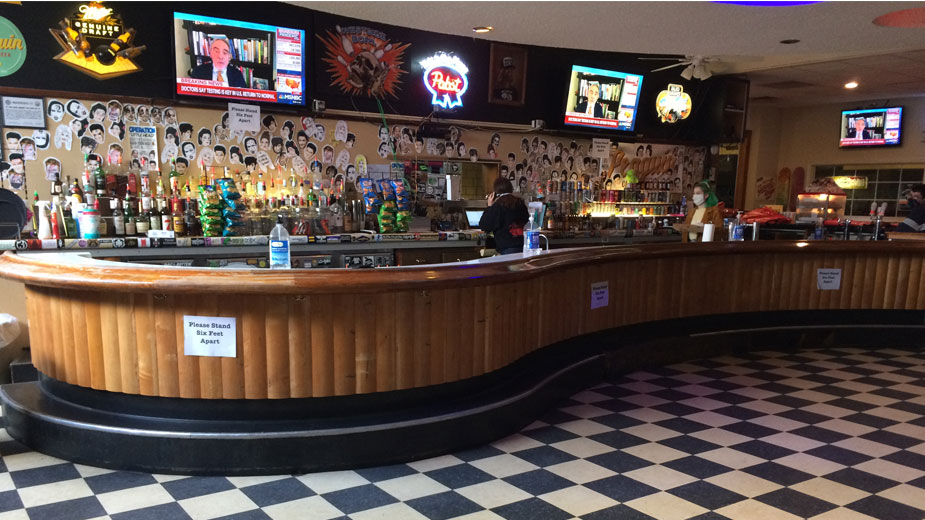
Offerdahl hopes to reopen at least some of his bowling alleys by July, and also is thinking about starting an online store for T-shirts and other memorabilia. He believes that life will get back to pre-virus normalcy in 2021, and hopes to be able to hang on until then.
“I will hope for the best and assume the worst,” Offerdahl says. He’s prepared to remain closed for months, but is grateful for his pizza business. “One silver lining might be that we’ve built up our carryout business so much that we can at least stay open and keep our name out there. Our food is good and if you put it in the hands of enough people, some will come back.”
Another thing that Westside Bowl has going for it is the strong sense of community among its regular patrons. It’s a second home for the rock ’n’ roll crowd, and they value its presence.
“I call myself a realist,” Offerdahl says. “Some call me a pessimist. But I bet everything I own on this side of town, a side that no one wanted to be on. I believe in this town, its people.
“We’ve made an investment in the community,” he continued, “and we are a community center. We’re getting support because we’ve been supportive of the community. People want us to stick around.”
Record Connection Feels the Loss of Record Store Day
The people who present Record Store Day underestimated the novel coronavirus. The annual event, for which dozens of top artists issue special album releases, was originally scheduled for April 18, but was rescheduled for June 20.
Now, it looks like Record Store Day might not happen at all in 2020, at least not as a large public event like it usually is. And that’s a problem for independent record stores nationwide, who make a sizable chunk of their annual revenues from the day.
In the Mahoning Valley, the biggest Record Store Day event is always at The Record Connection in Niles.
Jeff Burke, who has owned the shop for 40 years, has a bad feeling about it. Even though it hasn’t been officially canceled or postponed as of April 24, there is a silence within the industry that does not bode well.
“I have a gut feeling it won’t happen,” Burke says. “That’s a problem for me because it is a big event here.”
Last year, The Record Connection drew between 1,200 and 1,400 people to its Pinetree Square Plaza location at 32 Youngstown Warren Road. “It was the biggest day ever here,” Burke says.
Burke puts up a massive tent in the parking lot, has live bands, vendors and lots of exclusive musical merchandise.
“We were going to expand it this year,” Burke says. “I was going to put up the big tent and then a second tent just for Record Store Day product. The Labra Brothers were going to play until noon, and then Joe Grushecky from Pittsburgh would play at 1 p.m.” Vendors would include Cockeye Barbecue and Creamery, Redhead Wines, Havana House, artists and more.
Record Store Day accounts for 25% to 30% of his yearly revenue. “It’s a huge day for me,” Burke says. “We’ll sell easily over 1,000 Record Store Day releases alone. Plus people are buying CDs, used albums, record cleaners… everything sells that day.”
The day is like Christmas in April for Burke. There is a second and smaller Record Store Day on Black Friday, which seems safe for now.
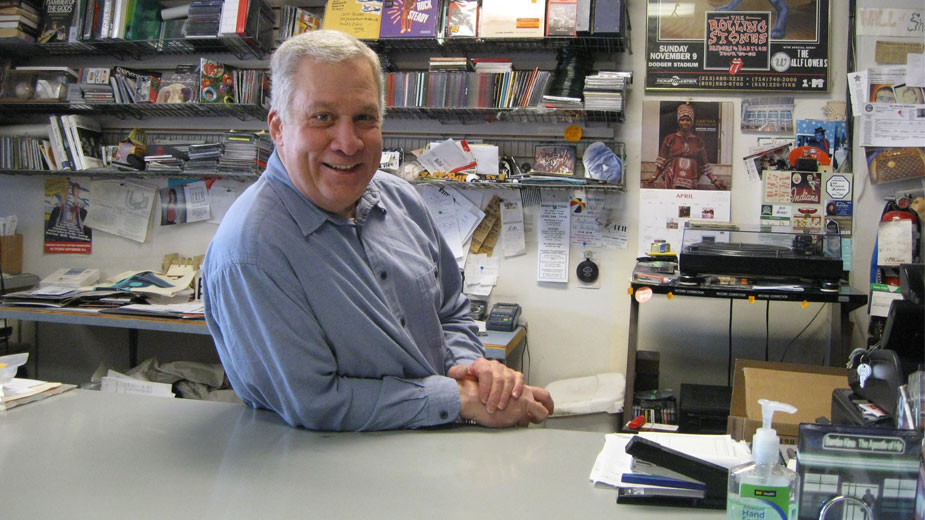
The Record Connection has been closed since March 16, due to the state mandate that closed nonessential businesses. To compensate for lost revenue, Burke has been beefing up his online sales on Amazon and Discogs, as well as his trade in used and rare records, which he regularly posts on Facebook.
He also does a fairly brisk trade in special orders. It made up 20% of his sales before the shutdown and that income has remained steady. Overall, The Record Connection’s sales for March were down 43%. “April will be much worse,” Burke says.
Burke hopes that his store is among those that will be permitted to open on May 12. “I saw that in Italy, they are opening the small mom and pop stores first,” he says. “We don’t get big traffic and we need the money more than anyone right now.”
Social distancing will not be a problem, as the store usually has no more than two or three customers in it.
Burke has long had a DJ business on the side, but everything is on hold there as well. “There’s a lot of rescheduling going on right now and some events I know are not going to happen,” he says. “High school proms, for example. I feel bad for the kids. I did Niles McKinley High’s last year, and they never left the dance floor from beginning to end. We had a blast.”
In the past, Burke worked as an event DJ 50 weekends a year, but now he is down to 15 to 20. “That’s all I want,” he says. “But I definitely miss that revenue.”
Burke is the sole employee of his store, which he opened in 1980. With the 40th anniversary this year, Burke foresees throwing a giant birthday party. His confidence in the future stems from his track record of overcoming obstacles.
“When I first bought my store, I returned a bunch of [unsold] 8-track tapes to the distributor only to have them sent back to me with a notice saying ‘no refunds, no returns’ because 8-tracks were on their way out,” he said. “So I was behind the 8-ball right out of the gate.”
He’s had other major setbacks and problems over the years, including a break-in and a case of embezzlement.
“I always came back,” he says. “I’ll get through this one, too. We’ve always created ways to get people to come back. My biggest concern is that all the momentum we built will go away, but I’m hoping customers come back.”
Funny Farm is Ready to Laugh Again
Laughter, like the coronavirus, is contagious, and both spread most effectively in a crowded room. No one knows that better than Dave Robich, who has owned and operated the Funny Farm comedy club since 1988.
The club has been in various locations over the years, but has been on the second floor of The Federal Building in downtown Youngstown since 2018.
The Funny Farm has been closed since March 16 when the state order against gatherings took effect. Robich is hoping he can reopen some time in June, but says he wouldn’t be surprised if it’s in the fall or even further in the future.
Comedy is needed now more than ever, but he wonders if people will show up at his club, and how many he will be allowed to let in.
“We are rescheduling shows now, but I worry about how this will change things,” Robich says.
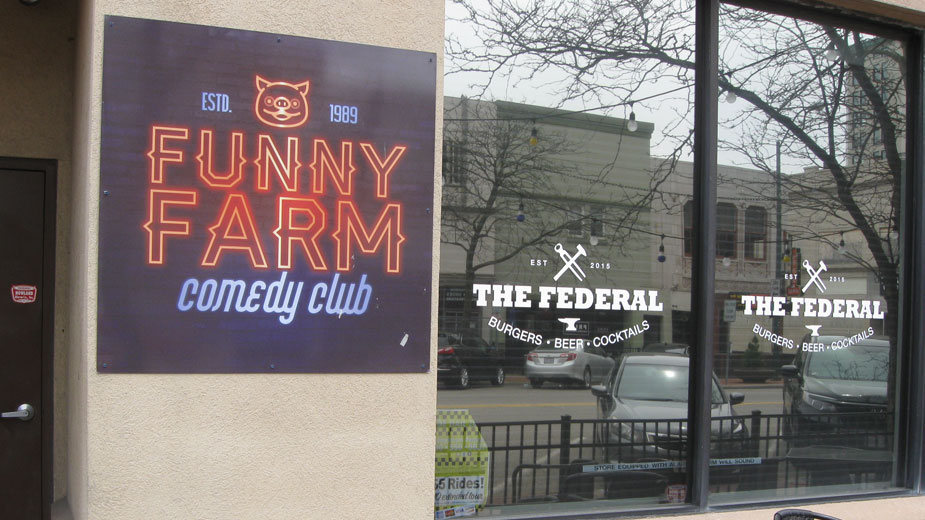
Social distancing requirements would put a damper on a show and on audience enjoyment. “What if I can only put 25 in a room that seats 100?,” he says. “Comedy is contagious and you lose that rolling laughter in a room with only 25.”
The atmosphere of a comedy club is something that can’t be replicated, he says.
“Watching on TV is not the same,” Robich says. “At any time, the comedian could be talking directly to you. There is a different edge to that. [Patrons] want to sit up front where they could be part of the show.”
Robich books comedians up to five months in advance, and has shows every Friday and Saturday. He also opens his club on week nights for private parties, and has had to cancel several.
“There’s not much we can do now,” he says. “I’ve been posting clips online to keep people entertained but there is no income coming in.” He has laid off his servers, most of whom are college students.
Robich worries that the stay-home habit will become permanent for many people. “How do you go back unless they have that vaccine or a cure,” he asks
That’s why he plans to reopen with a bang when he gets permission.
“I am thinking of bringing in someone big for the restart, someone with a very recognizable name,” he says.
Golden Star Theaters Renovates for Social Distancing
Movie theater operators nationwide have set their sights on July 17 as the target date for reopening. That’s when Christopher Nolan’s mind-bending action flick “Tenet” is scheduled for release.
But while theater chain operators large and small are eyeing the date, they know nothing is certain.
The coronavirus pandemic has been like a disaster flick that came true for the industry, which has been shut down for six weeks and counting.
Golden Star Theatres is a regional chain with three multiplexes in the Mahoning and Shenango valleys.
Frank Moses, president of the New Castle, Pa., company, says making customers feel safe and comfortable will be the key when theaters finally reopen. Seating capacity will likely be reduced due to social distancing measures and disinfection will be front and center.
“At first, [patrons] will be cautious but I think they will get a level of comfort over time,” Moses said.
To ease fears, Golden Star is contemplating a concierge at each theater, who will walk patrons to their seats and wipe them down with disinfectant before they sit.
“The labor cost will be higher but it is needed,” Moses said.
Shields are being installed at the concession stands as another measure. “the goal is to keep customers and employees safe,” Moses said.
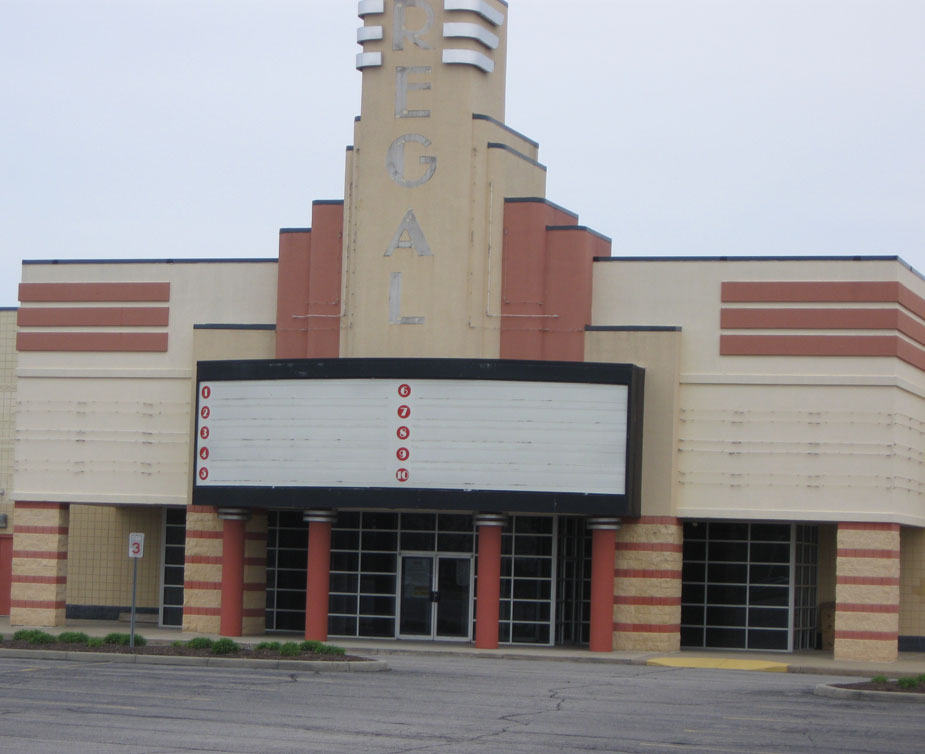
Golden Star owns the former Regal Cinemas facility in Austintown, which has been closed for renovations since its purchase a few months ago; Shenango Valley Cinemas in Hermitage, Pa.; Westgate Cinemas in New Castle, Pa.; and multiplexes in suburban Pittsburgh and La Vale, Md.
Moses expects Ohio to phase in movie theaters ahead of Pennsylvania, which has been harder hit by the virus, especially in the Philadelphia area. But Pennsylvania Gov. Tom Wolf could open up counties in the western part of the state sooner, he said.
Golden Star has laid off about 150 employees, all of whom are part-time.
During the shutdown, Hollywood has been releasing movies straight to homes, and delaying the release of others. Moses notes that some smaller movies have always gone straight to video, and he expects that practice to continue after the shutdown ends.
“The film industry will seek a happy medium. Some movies will be released [to homes] but not the tentpoles,” Moses said, referring to the blockbuster films that generate the lion’s share of profit for studios.
The summer film season was to begin April 24 with the release of the Marvel superhero flick “Black Widow,” which has been delayed until November.
“[Distributors] are pushing back the calendar,” Moses said. “It is all still fluid.”
Release dates are tentatively set a year or two in advance. The calendar is currently being rearranged to squeeze in movies that have been delayed.
The shutdown has given Golden Star time to renovate its Austintown property. The 10-screen multiplex is getting a complete makeover, with the addition of luxury seating and a new concession area, with alcohol sales.
A skeleton construction crew has been making some progress but Moses said the pace of work will pick up when the state gives the green light. Opening is anticipated for July or August. The plush, reclining seats, with wide armrests, will be better for social distancing, Moses said. The new seats are so large compared to the old seats, that capacity will be reduced by about two-thirds.
The Austintown facility currently has a total of close to 2,000 seats in its 10 auditoriums. When it reopens, total capacity will be around 700, with each auditorium ranging in size from 50 to 150 seats, Moses said.
Pictured above: Youngstown Playhouse
